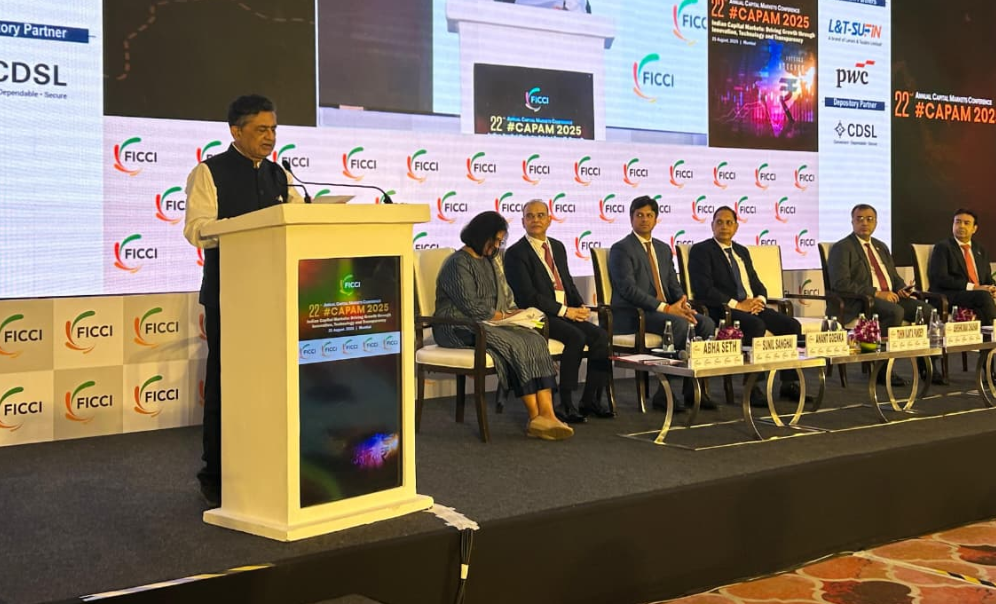
The Indian equity market has undergone a remarkable transformation over the last three decades, and the pace of retail participation is now at an all-time high. Speaking at the FICCI Annual Markets Conference, Ashish Chauhan, CEO of the National Stock Exchange (NSE), highlighted some of the most significant milestones that reflect the evolution of India’s financial markets.
One of the standout points he shared was that retail investors today hold 18.5 percent of the total market capitalization. This indicates how strongly individual investors have integrated into the country’s financial ecosystem. Traditionally, institutional investors such as mutual funds, foreign institutional investors (FIIs), and insurance companies dominated the market. However, the growing contribution from retail participants is proof of increasing financial literacy, wider access to investment platforms, and a shift in savings from traditional assets like gold and real estate to equities.
Over the past 30 years, India’s equity market capitalization has surged an extraordinary 125 times, reaching ₹450 lakh crore. This sharp rise underlines the growth potential of the Indian economy and the confidence investors have shown in the long-term prospects of listed companies. Not only does this expansion highlight wealth creation opportunities, but it also reflects the deepening of India’s capital markets, making them more resilient and globally competitive.
A particularly striking data point shared by Chauhan was that one in every four Indian households is now investing in equities. This figure demonstrates that stock market investments are no longer confined to a small segment of society. With increasing penetration of digital platforms, mobile trading apps, and simplified onboarding processes such as e-KYC, families across both urban and semi-urban regions are becoming active participants in wealth creation through equities. This trend is also fueled by growing awareness campaigns and government initiatives promoting financial inclusion.
The rise of unique investors on the NSE has also been phenomenal. The exchange currently has 11.8 crore unique investors, marking a sevenfold increase in just 11 years. Such rapid growth in investor accounts underscores the democratization of equity markets in India. More people are opening demat accounts and taking an active interest in building their financial portfolios. This surge is a positive sign for the market’s long-term stability as a diversified investor base helps reduce volatility and strengthens market depth.
Another encouraging trend is the increasing participation of women investors. According to Chauhan, women now account for 25 percent of the total investor base. This represents a major shift, as women are increasingly taking control of financial decisions, not only contributing to household financial security but also playing a significant role in the larger economy. With the rise of dual-income households and greater financial independence, women investors are expected to play an even bigger role in shaping India’s investment landscape in the years ahead.
In addition, the popularity of passive investment products has gained traction. Passive products, including index funds and exchange-traded funds (ETFs), now form 17 percent of the total assets under management (AUM) of mutual funds. This reflects a changing investment mindset among Indians who are looking for low-cost, diversified, and relatively safer investment options that track market indices. Globally, passive investing has seen massive growth, and India seems to be following a similar trajectory.
The insights shared by Ashish Chauhan highlight how far India’s capital markets have come and how retail investors are becoming a driving force behind this transformation. From households actively investing in equities to the rising role of women and the growing adoption of passive products, the landscape of Indian investing is diversifying rapidly.
With technological advancements, regulatory support, and an increasingly financially aware population, India is poised to witness an even greater wave of retail investor participation in the coming years. This will not only contribute to individual wealth creation but also play a critical role in strengthening the country’s economic foundations.
Disclaimer:
This article is for informational purposes only and is based on insights shared at the FICCI Annual Markets Conference. It does not constitute financial advice or investment recommendations. Readers are advised to conduct their own research or consult a qualified financial advisor before making any investment decisions.




